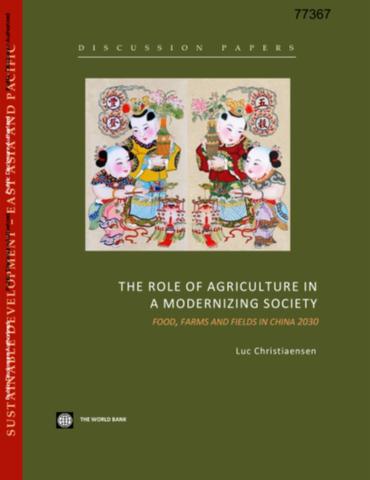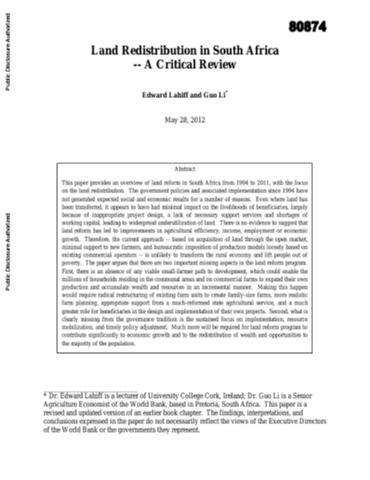The World Bank is a vital source of financial and technical assistance to developing countries around the world. We are not a bank in the ordinary sense but a unique partnership to reduce poverty and support development. The World Bank Group has two ambitious goals: End extreme poverty within a generation and boost shared prosperity.
- To end extreme poverty, the Bank's goal is to decrease the percentage of people living on less than $1.25 a day to no more than 3% by 2030.
- To promote shared prosperity, the goal is to promote income growth of the bottom 40% of the population in each country.
The World Bank Group comprises five institutions managed by their member countries.
The World Bank Group and Land: Working to protect the rights of existing land users and to help secure benefits for smallholder farmers
The World Bank (IBRD and IDA) interacts primarily with governments to increase agricultural productivity, strengthen land tenure policies and improve land governance. More than 90% of the World Bank’s agriculture portfolio focuses on the productivity and access to markets by small holder farmers. Ten percent of our projects focus on the governance of land tenure.
Similarly, investments by the International Finance Corporation (IFC), the World Bank Group’s private sector arm, including those in larger scale enterprises, overwhelmingly support smallholder farmers through improved access to finance, inputs and markets, and as direct suppliers. IFC invests in environmentally and socially sustainable private enterprises in all parts of the value chain (inputs such as irrigation and fertilizers, primary production, processing, transport and storage, traders, and risk management facilities including weather/crop insurance, warehouse financing, etc
For more information, visit the World Bank Group and land and food security (https://www.worldbank.org/en/topic/agriculture/brief/land-and-food-security1
Resources
Displaying 3891 - 3895 of 4906Evaluation of New Fishery Performance Indicators
To further develop and finalize the Fishery Performance Indicators (FPIs) for scaling up to the Bank's entire fisheries portfolio, a number of specific pilots and case studies have been conducted. This report provides an overview of the FPIs, and a summary of two case studies in its application, the blue swimming crab (BSC) fisheries in Indonesia and the Philippines. A comparative analysis with an Icelandic lobster fishery is conducted as a benchmark, as the Icelandic lobster fishery is also export oriented and has been recognized as a well-managed fishery.
Wan Sip, Plante Kapten
The body of this report consists of five sections. Section one is an introduction to the JBE program and the context for the lease research on Tanna. Section two provides a profile of some of the relevant historical and economic features of the island and aspects related to the structure of governance and civil society organization. This is followed in section three by a summary of key findings regarding the 64 leases studied on Tanna.
The Role of Agriculture in a Modernizing Society
China's success in addressing food problems after adopting the reforms in 1978 has been nothing less than remarkable. Grain output (rice, wheat and maize) has almost doubled and most hunger has been eliminated. Ever since China embarked on its reform agenda more than 30 years ago, its economic growth and poverty reduction have been nothing less than remarkable. Agriculture has been an important contributor to these developments.
Unlocking Land Values to Finance Urban Infrastructure
Urban growth throughout the developing
world has created a challenge for financing infrastructure.
Investment in infrastructure is needed to provide basic
services for newly developed parts of urban areas. It is
needed to meet the demand for a safer and more reliable
water supply, higher standards for the removal and treatment
of wastewater and solid waste, and the transportation
requirements of a population whose expectations of mobility
Land Redistribution in South Africa
This paper provides an overview of land reform in South Africa from 1994 to 2011, with the focus on the land redistribution. The government policies and associated implementation since 1994 have not generated expected social and economic results for a number of reasons. Even where land has been transferred, it appears to have had minimal impact on the livelihoods of beneficiaries, largely because of inappropriate project design, a lack of necessary support services and shortages of working capital, leading to widespread underutilization of land.










